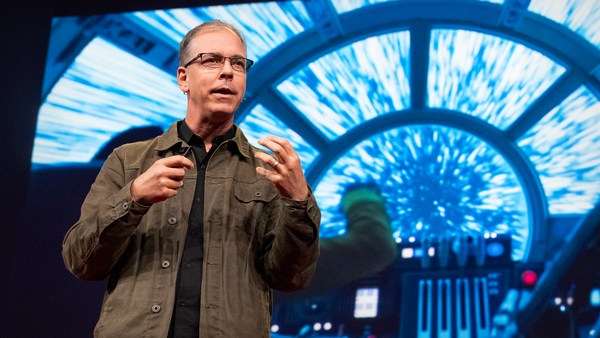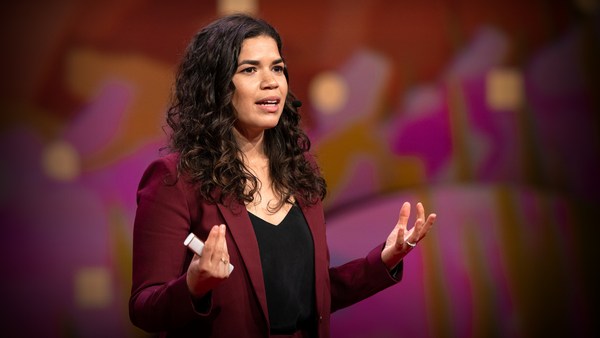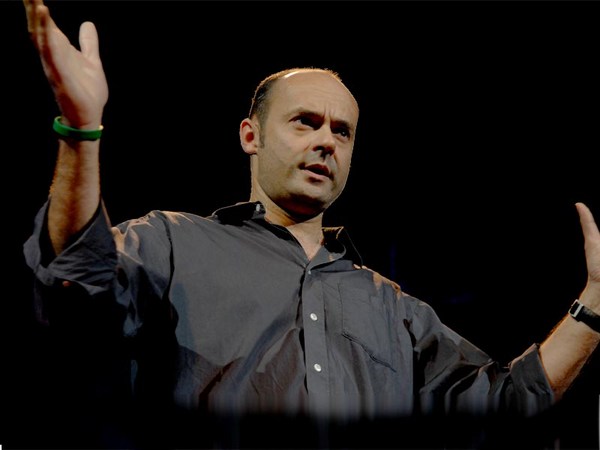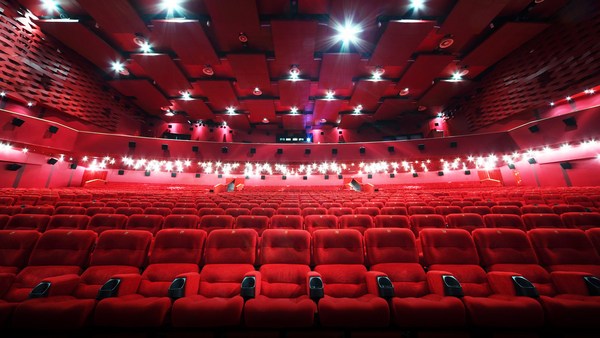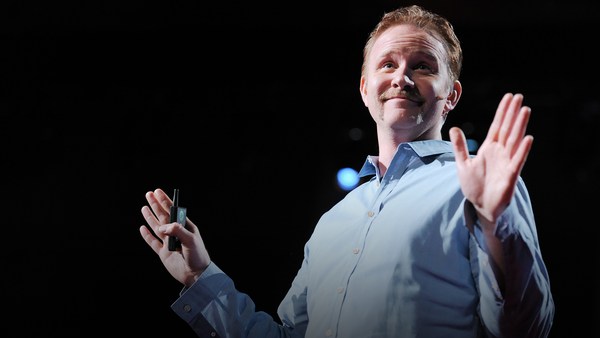I've directed four films starring Will Smith. Three of them were the first three “Men in Black” movies. And in spite of them making about two billion dollars at the box office, Will Smith never really thought I had a clue. He wanted to take me to his old high school, point to me and say: "If this man can be a successful film director on big budget films, anyone can."
The truth is, for all of you here, if I could be a successful director on big budget films, anyone can. So I'd like to share with you nine thoughts I have tonight that will help you in your future endeavors.
And the first one is going to be a little disappointing to some of you, which is, there is no upside to optimism. OK, let me explain that.
(Laughter)
Every time I get off an airplane, I view it as a failed suicide attempt.
(Laughter)
That is where embracing pessimism comes in. You see, as soon as I buckle in, I turn to Sweetie, my wife, and I say, "This plane is going to crash."
(Laughter)
Now I can relax because one of two things happen. Either the plane starts nosediving towards Earth, at which point I get to elbow Sweetie and gloat, “Was I right, or what?” Or the plane lands successfully, and we live. Win-win. So always under-promise and overdeliver. OK -- Thank you, thank you.
OK, number two. Number two is, never let anyone know you're working on a comedy. Now this may be true specifically for film directors, but it's also true for telling a joke. OK, you never want anyone to be funny. If the wardrobe person thinks it's funny, the costumes are going to be too colorful. If your cinematographer thinks you're working on a comedy, the lighting will be too bright. If the composer composes for comedy, you're going to have slide whistles and triangles. And worst of all is if the actors think they're working on a comedy. You only want the actors to play the reality of the scene, and you want the audience to find the comedy. Never, ever let your actors be funny.
OK, number three, be punctual. I was a senior in high school when I asked my overbearing mother if I could attend a concert at Madison Square Garden with my girlfriend. The fact that I was 17 years old and needed parental permission is another story for another TED Talk. Anyway, Sweetie says sorry -- not Sweetie! Oh my God, was that a Freudian thing? I don't think it was. No, it was, it was. Sweetie, I love you so much, and you're not my mother. OK, let's continue.
(Laughter)
So in any case, my mother says -- My mother says, “You can go as long as you’re home by 2am.” At 2:20am, Jimi Hendrix and his Band of Gypsys take the stage. As they are warming up in front of 19,600 people, the following announcement echoes throughout Madison Square Garden:
(Laughter)
"Barry Sonnenfeld, call your mother."
(Laughter)
Now I know the only reason I’m being paged is because my father has died -- he hasn't. My father has died, and I will spend the rest of my life living as an aging virgin with my mother. OK. Mom already threatened to commit suicide if I attended sleepaway school. You guys call that college. OK, so I find a payphone, I call mom, "Who died?"
(In a crying voice) "I thought you did. You were supposed to be home at two, and it's 2:20."
"But, mom, didn't they tell you the concert was still going on?"
"Well, they did, but they couldn't confirm you were there."
OK, so Jimi, a tad annoyed by the PA announcement, walks off stage, never to return.
(Groans)
Eight months later, he was dead. And I blame my mother.
(Laughter)
So let's talk about punctuality. As far as I'm concerned --
(Laughter)
Being early is being on time. Being on time is actually late. And late gets you paged at Madison Square Garden.
OK, let's go to the next one, which is number four, which is, don't work your way up the ladder. I was a film school student, and I realized I was a pretty good cinematographer, so I decided that's what I would be. When I got out of college, I bought a used 16-millimeter camera so I could call myself a cameraman without feeling like a dilettante. Six months later, I meet Joel Cohen, 50 percent of the Cohen brothers, at a Christmas party. Joel tells me he and his brother Ethan have written a script called “Blood Simple,” and they’re going to shoot a trailer as if the movie was already made, and they're going to use this trailer to raise money from investing groups to then make their film. So I tell Joel, I have a camera. He tells me I'm hired. So I get hired, and a year later, we find ourselves in Austin, Texas, in production. The first day of filming on “Blood Simple” was the first day that Joel, Ethan, or I had ever been on a movie set. Don't work your way up.
OK. Number five. This one's going to get back into the Rob Reiner of it all, which is, let it be their decision. I was a cinematographer on "When Harry Met Sally" for Rob, and we were shooting a night scene in lower Manhattan with Billy Crystal, Meg Ryan, Bruno Kirby and Carrie Fisher. So they came to the set, which was on West Broadway, they rehearsed the scene while reading from the script as they walked down West Broadway, and then went back into hair and makeup while I lit the scene. I told Rob we were ready, the actors came back, now knowing their lines, walking much faster, and they walk 50 feet beyond where I'm lit.
I say to Rob, "Can you slow down their walk so they can stop where they did during rehearsal?"
Rob says, "You know what, Bar? I don't want them to worry about anything but performance. Can you light it so they can stop anywhere?"
So I say, "Sure, give me 14 minutes."
Now here's something else you should learn. Never give estimates in round numbers. By saying 14, 11, 17 or any other arcane number, you really sound like you know what you're talking about.
(Laughter)
So I lit another 67 feet -- see where I went with that? Sixty-seven feet, told Rob we're ready, and Rob says, "Well, will it still look pretty, Bar? Will it still look beautiful?"
I said, "Well, it won't look as beautiful, but now they can stop wherever they want."
Rob says, "We don't want not beautiful, we want beautiful. Where do they have to stop where it will look beautiful?"
"Uh, back where they stopped during rehearsal?"
Rob calls the actors over says, "Guys, stop where you did during rehearsals. Slow down your walk."
At that moment, I learned something. I let it be Rob's decision to get what I wanted.
So later that night, I’m shooting Meg Ryan’s close-up. Meg was great fun to work with, but she didn't always hit her mark. So tonight, with this newfound information, I said to Meg, "Hey, Meg, it doesn't matter where you stop, but if you land right here, you look gorgeous."
(Laughter)
She hit her mark every time.
(Laughter)
So let it be their decision.
OK, here's an easy one, number six, which is, never stand on the end of a group photo. You've got two things working against you. First of all, the physics of a wide-angle lens on most cameras makes anyone on the edge of frame sort of seem wide. And second of all, you're easy to crop out of the photo, so you always want to stay in the center where the important person is. OK, that's an easy one.
Number seven, which is, oh, this is a good one. It’s called out-juvenile a screaming bully. OK. The first movie I directed was produced by the famous Scott Rudin. Scott was a brilliant producer but a legendary screamer and bully. So this is how I tamed the beast. OK. Whenever I was in Scott's office on both "Addams Family" and "Addams Family Values," and he would scream at me, I would remove the pillows and bolsters from his couch, I would build myself a fort, I would climb into the fort, and I would say, "I can't hear you. I'm in the fort."
Scott would scream, “Get out of the goddamn fort, Sonnenfeld! I don't have a lot of time."
"Sorry, Scott. I’m still in the fort, and I can’t hear you screaming. Did you say something?"
Eventually, Scott would give in, apologize, I would leave the fortress. But here's the thing. Never once over two movies did he invade the sanctity of the fort.
(Laughter)
Never once did he lift up a pillow and say, "Schmuck, there is no fort." So really, go for the juvenile.
OK, we're almost done, I promise. Number eight is, be willing to kill your darlings. I was the director of "Get Shorty," and the budget for "Get Shorty" was 30,250,000 dollars. The head of the studio, Mike Marcus, said, "Thirty million, not a penny more."
I said, "OK, we'll lose the night scene with Gene Hackman. It takes place over two nights. It costs 250,000, and it doesn't move the plot forward. So it's easy to get rid of."
Mike said, "You can't lose that scene. It's my favorite scene in the movie." By the way, whenever you want to lose a scene, it's always some executive's favorite scene in the movie.
So I said, "Mike, you have no choice. We've got to come in at 30 million, and losing this scene puts us at 30 million."
Mike says, "Don't tell me I have no choice. I'm the head of the studio. What's it going to cost to put that scene back in?"
(Laughter)
"250,000."
"You got it."
That's another example, by the way, of let it be their decision.
And finally, and most important. Always carry a photo of how you like your steak prepared.
(Laughter)
Now --
(Laughter) This particular photo was cut out of a SkyMall catalog in 2005. I've had this for 20 years. So here's what you do. You order a steak, the waiter says, "How would you like a prepared?"
And you say, "What does your restaurant call this?"
The waiter looks at it and says, "Oh, that's our medium rare plus."
You say, "I would like a medium rare plus New York strip, please."
Never, ever, ever, ever say, “Cook it like this.” Because that’s giving the chef a line reading, and they don’t like it. In fact, Sweetie and I got kicked out of the Sage Creek Grill in Custer, South Dakota, but that’s another story for another TED Talk,
So in conclusion, I would say, you now have nine pieces of information that will help you become a successful film director on big budget films.
Thank you very much.
(Cheers and applause)
Thank you, thank you very much, thank you.
